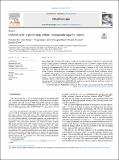| dc.contributor.author | Xie, Guozhu | |
| dc.contributor.author | Dong, Han | |
| dc.contributor.author | Liang, Yong | |
| dc.contributor.author | Ham, James Dongjoo | |
| dc.contributor.author | Rizwan, Romee | |
| dc.contributor.author | Chen, Jianzhu | |
| dc.date.accessioned | 2022-02-07T15:10:31Z | |
| dc.date.available | 2021-10-27T20:23:21Z | |
| dc.date.available | 2022-02-07T15:10:31Z | |
| dc.date.issued | 2020-09 | |
| dc.date.submitted | 2020-08 | |
| dc.identifier.issn | 2352-3964 | |
| dc.identifier.uri | https://hdl.handle.net/1721.1/135407.2 | |
| dc.description.abstract | © 2020 The Author(s) Natural Killer (NK) cells and CD8+ cytotoxic T cells are two types of immune cells that can kill target cells through similar cytotoxic mechanisms. With the remarkable success of chimeric antigen receptor (CAR)-engineered T (CAR-T) cells for treating haematological malignancies, there is a rapid growing interest in developing CAR-engineered NK (CAR-NK) cells for cancer therapy. Compared to CAR-T cells, CAR-NK cells could offer some significant advantages, including: (1) better safety, such as a lack or minimal cytokine release syndrome and neurotoxicity in autologous setting and graft-versus-host disease in allogenic setting, (2) multiple mechanisms for activating cytotoxic activity, and (3) high feasibility for ‘off-the-shelf’ manufacturing. CAR-NK cells could be engineered to target diverse antigens, enhance proliferation and persistence in vivo, increase infiltration into solid tumours, overcome resistant tumour microenvironment, and ultimately achieve an effective anti-tumour response. In this review, we focus on recent progress in genetic engineering and clinical application of CAR-NK cells, and discuss current challenges and future promise of CAR-NK cells as a novel cellular immunotherapy in cancer. | en_US |
| dc.language.iso | en | |
| dc.publisher | Elsevier BV | en_US |
| dc.relation.isversionof | http://dx.doi.org/10.1016/j.ebiom.2020.102975 | en_US |
| dc.rights | Creative Commons Attribution-NonCommercial-NoDerivs License | en_US |
| dc.rights.uri | http://creativecommons.org/licenses/by-nc-nd/4.0/ | en_US |
| dc.source | Elsevier | en_US |
| dc.title | CAR-NK cells: A promising cellular immunotherapy for cancer | en_US |
| dc.type | Article | en_US |
| dc.contributor.department | Koch Institute for Integrative Cancer Research at MIT | |
| dc.contributor.department | Massachusetts Institute of Technology. Department of Biology | |
| dc.relation.journal | EBioMedicine | en_US |
| dc.eprint.version | Final published version | en_US |
| dc.type.uri | http://purl.org/eprint/type/JournalArticle | en_US |
| eprint.status | http://purl.org/eprint/status/PeerReviewed | en_US |
| dc.date.updated | 2021-07-15T15:35:38Z | |
| dspace.orderedauthors | Xie, G; Dong, H; Liang, Y; Ham, JD; Rizwan, R; Chen, J | en_US |
| dspace.date.submission | 2021-07-15T15:35:40Z | |
| mit.journal.volume | 59 | en_US |
| mit.license | PUBLISHER_CC | |
| mit.metadata.status | Authority Work Needed | en_US |
